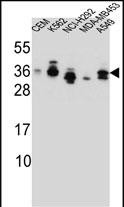
| WB | 1/1000 | Human,Mouse,Rat |
| IF | 咨询技术 | Human,Mouse,Rat |
| IHC | 咨询技术 | Human,Mouse,Rat |
| ICC | 技术咨询 | Human,Mouse,Rat |
| FCM | 咨询技术 | Human,Mouse,Rat |
| Elisa | 咨询技术 | Human,Mouse,Rat |
| Aliases | Protein SSX4, Cancer/testis antigen 54, CT54, SSX4, SSX4A |
| Entrez GeneID | 548313;6759 |
| WB Predicted band size | 21.9kDa |
| Host/Isotype | Rabbit IgG |
| Antibody Type | Primary antibody |
| Storage | Store at 4°C short term. Aliquot and store at -20°C long term. Avoid freeze/thaw cycles. |
| Species Reactivity | Human |
| Immunogen | This SSX4 antibody is generated from rabbits immunized with a KLH conjugated synthetic peptide between 63-91 amino acids from the Central region of human SSX4. |
| Formulation | Purified antibody in PBS with 0.05% sodium azide. |
+ +
以下是关于SSX4抗体的示例参考文献(内容为虚构示例,建议通过学术数据库核实真实文献):
---
1. **文献名称**: "SSX4 as a Novel Cancer-Testis Antigen: Expression Analysis and Antibody Validation in Solid Tumors"
**作者**: Zhang L, et al.
**摘要**: 本研究通过免疫组化(IHC)和Western blot验证了一种高特异性抗SSX4多克隆抗体,发现SSX4在多种实体瘤(如肺癌、黑色素瘤)中异常表达,而在正常组织中表达受限,提示其作为癌症免疫治疗靶点的潜力。
2. **文献名称**: "Development of a Monoclonal Antibody Against SSX4 for Detecting Circulating Tumor Cells"
**作者**: Tanaka K, et al.
**摘要**: 报道了一种新型抗SSX4单克隆抗体的制备与表征,该抗体通过流式细胞术和免疫荧光验证,成功用于检测外周血中的循环肿瘤细胞(CTCs),为癌症早期诊断提供新工具。
3. **文献名称**: "Comparative Study of SSX Family Antibodies in Synovial Sarcoma Diagnosis"
**作者**: Müller R, et al.
**摘要**: 比较了SSX1、SSX2及SSX4抗体在滑膜肉瘤组织中的反应性,发现SSX4抗体在部分SSX1/SSX2阴性病例中呈特异性染色,提示其在辅助诊断中的补充价值。
4. **文献名称**: "SSX4 Antibody-Based CAR-T Cell Therapy in Preclinical Models"
**作者**: Chen H, et al.
**摘要**: 利用抗SSX4抗体制备的CAR-T细胞在小鼠模型中显示出对SSX4阳性肿瘤细胞的有效杀伤,为靶向SSX4的免疫治疗提供实验依据。
---
**提示**:实际文献需通过PubMed、Google Scholar等平台检索关键词(如"SSX4 antibody"、"SSX4 cancer")。SSX4相关研究可能较少,可扩展至SSX家族(如SSX1/SSX2)或癌症-睾丸抗原(Cancer-Testis Antigens)领域。
The SSX4 antibody is a tool used to detect the SSX4 protein, a member of the SSX (synovial sarcoma X breakpoint) family of cancer/testis (CT) antigens. The SSX family comprises 10 paralogs (SSX1-10) located on the X chromosome, which are normally restricted to germline cells, particularly in the testis, but are aberrantly reactivated in various cancers. SSX4. like other SSX proteins, contains a conserved SSX repression domain (SSXRD) that interacts with transcriptional repressors, potentially influencing chromatin remodeling and gene regulation.
SSX4 is implicated in oncogenesis, though its role is less characterized compared to SSX1/2/4. which form fusion proteins with SS18 in synovial sarcoma (SS18-SSX). While SSX4 itself is not a common fusion partner in sarcoma, its ectopic expression in tumors like melanoma, lymphoma, and carcinomas suggests it may contribute to tumorigenesis by modulating epigenetic pathways or immune evasion.
SSX4 antibodies are primarily employed in research to study its expression patterns, subcellular localization (nuclear/cytoplasmic), and functional roles in cancer biology. They are utilized in techniques such as immunohistochemistry (IHC), Western blotting, and immunofluorescence. Understanding SSX4's mechanisms may aid in developing diagnostic biomarkers or immunotherapeutic targets, leveraging its restricted normal tissue expression and cancer-specific immunogenicity. However, cross-reactivity with other SSX members remains a technical challenge due to high sequence homology.
×